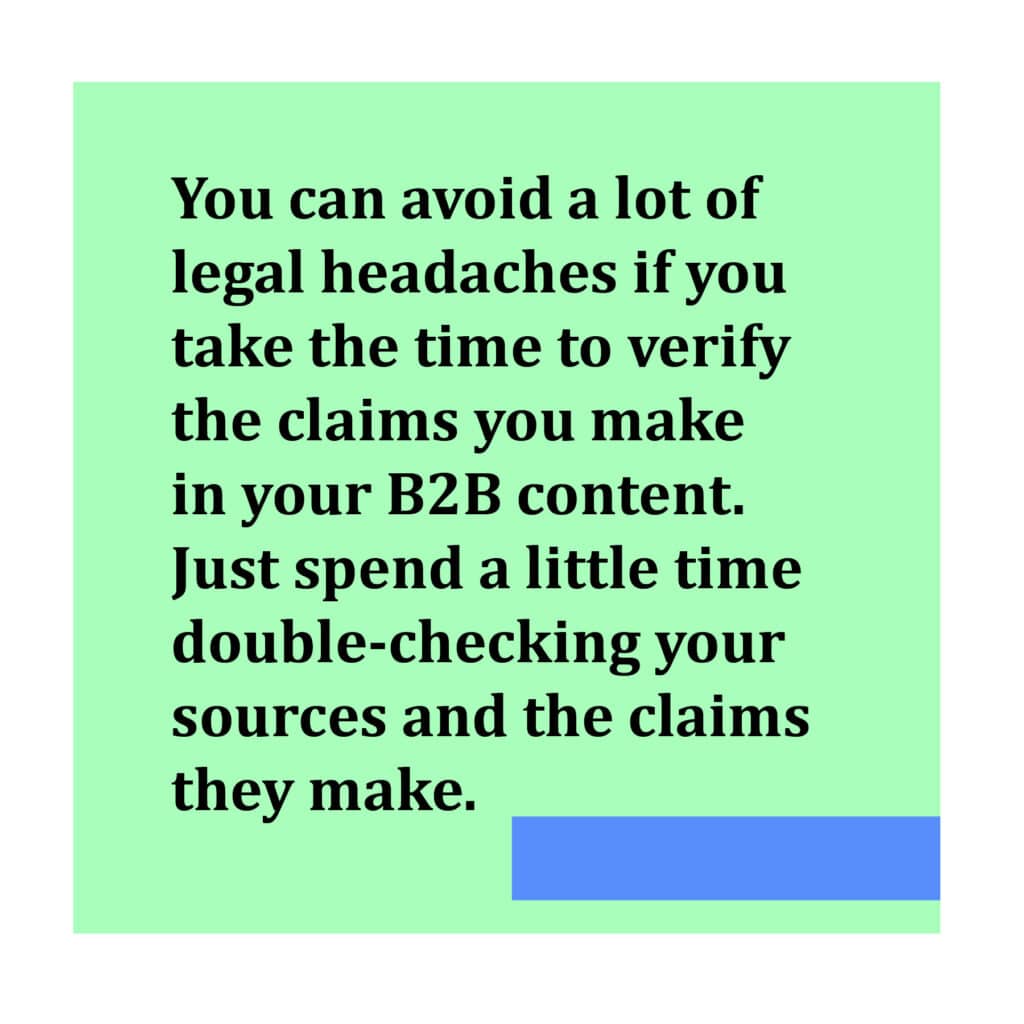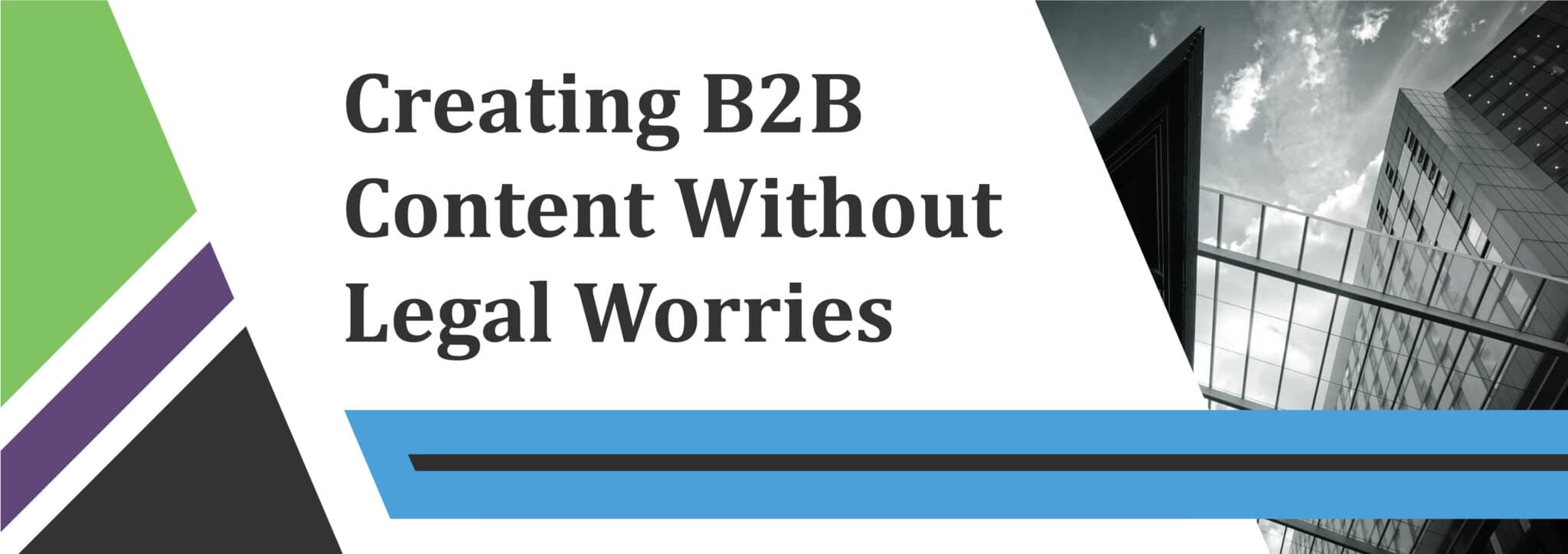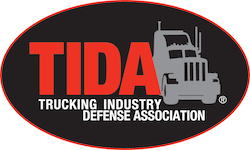September 20, 2021 by Wilton Blake
Creating B2B Content Without Legal Worries
Your business-to-business (B2B) content may showcase your business or highlight your greatest successes, but is it legal? This post will discuss some issues with B2B content that risk flirting with litigation and suggest methods to avoiding them.
What is B2B Content?
B2B content—whether it’s a Case Study, White Paper, or a Video Testimonial—is powerful and persuasive when used in marketing throughout the sales cycle. Written Case Studies and Video Testimonials describe real-life situations where your company overcame obstacles and solved client problems. A White Paper is a more formal, detailed type of well-researched content that focuses on an industry-specific issue your company can address with authority.
What all three types of B2B content have in common is that they’re meant to instill trust in your company. Prospects are more likely to give you their business if you’re an expert in your field with a proven history of customer success.
But when your B2B content is riddled with potential legal issues, that trust in your company breaks down.
Legal Issues with B2B Content
- Potential legal problems concerning B2B content that can arise include the following:
- Criticizing a company
- Making false or misleading claims
- Misquoting sources
- Failing to get permissions and approvals
Criticizing a Company
When you criticize a company in your B2B content, you risk being sued for libel. Libel is a form of defamation that injures a third-party’s reputation in writing.
It’s relatively easy to libel another company in a Case Study, White Paper, or a Video Testimonial. Each of those B2B content types showcase you demonstrating how your company—and yours alone—had the ability to solve a problem for your client. It may be tempting to point out how another company offering similar services or products can’t compare, or perhaps even caused the client’s problem. In a few cases, simply mentioning the other company may be fine. Generally, though, when you start publicly criticizing another company, you’re on thin legal ice.
- If your writing has all the following three elements, you will likely be found guilty of libel:
- Your B2B content contains a false statement purporting to be fact. An example of this might be “Company A has an inferior product.”
- You communicated that false statement to a third person. By distributing a printed document or a PDF, you are communicating that false statement to a third person.
- Your communication is at least negligent. This means that you had no intention to bad-mouth Company A, but you failed to behave with the level of care that someone of ordinary prudence would have exercised under the circumstances.
Your communication caused some harm to Company A. This harm could be lost sales or a damaged reputation.
Making False or Misleading Claims
You may be guilty of making a false or misleading claim if you knowingly distribute B2B content that presents a false, fictitious, or fraudulent claim. This includes either making a statement or omitting a material fact. For instance, your B2B content might state that your company’s paint lasts ten years when you are fully aware that your company’s paint only lasts five years.
Misquoting Sources
You may be guilty of misquoting a source when your B2B content includes an interviewee’s quote that’s fabricated or presented in an inaccurate way the interviewee never intended. Essentially, if you indicate someone has said something they’ve never said, you’ve misquoted your source and undermined the trust you’re attempting to build with your B2B content.
Imagine you’re interviewing the customer of Company B for a Case Study. If the writer of the B2B content invents quotes that the interviewee never said, or pieced together various quotes to make it seem that the interview said something favorable about Company B, then the writer has misquoted the customer.
Failing to Get Permissions and Approvals
This is a catch-all problem that can get you into trouble. When you distribute a Case Study, White Paper, or Video Testimonial that contains a statement about a company or by someone you’ve interviewed, it’s prudent to get permission to use that statement. When you fail to get explicit approval, the company or interviewee can claim that the B2B content is false or misleading. This puts your company in legal jeopardy.
How to Ensure the Legality of Your B2B Content
Here are a few suggestions to avoid the legal pitfalls of your B2B content:
- Get permissions and approvals
- Record interviews
- Verify claims
- Avoid criticizing other companies
- Have your legal team review it
- Have their legal team review it
Get Permissions and Approvals
Getting permission from the interviewee or the company that is the subject of your B2B content is one of the best ways to stay out of legal trouble.
When they give their stamp of approval to the content, it’s very difficult for them to come back at a later date and claim that the interviewee was misquoted or that the B2B content contains defamatory language.
When you seek permission to publish your content, be sure to get that permission in writing. Verbal permission is not enough. You want to be able to show a judge or arbitrator that the complaining party reviewed the content and gave you their blessing to publish it.
Record Interviews
Another excellent way to avoid legal issues is to record each interview. By recording the interview, you have the exact language used by the interviewee. As long as you use that exact language in your B2B content, no legal issues should arise. Interviewees can’t say they were misquoted when their responses to your questions are recorded.
Recording interviews is also a good way to avoid the trouble of making false or misleading claims in your B2B content. Again, as long as you stick to the statements made in the interview, you can argue that, as far as you know, the statement is correct.
Verify Claims
You can avoid a lot of legal headaches if you take the time to verify the claims you make in your B2B content. Just spend a little time double-checking your sources and the claims they make. Listen to the interview again to make sure that you have accurately represented what the interviewee has said.
Avoid Criticizing Other Companies
It’s that old adage: “If you can’t say something nice, don’t say anything at all.” There’s really no reason to mention any other company in your B2B content at all, let alone criticize them. Keep your content focused on you and your client.
Even if your client had a miserable experience with a previous vendor, avoid naming the vendor or providing identifying characteristics in your B2B content, even if the vendor is your biggest competitor. Instead, summarize the problems and challenges the client had, and keep the focus on the positive: namely, how your company provided a solution. Not only is doing so in good taste, you may side-step a nasty defamation claim. You definitely don’t want to create a Case Study in hopes of attracting new business and wind up attracting a lawsuit instead.
Have Your Legal Team Review It
This applies to all B2B content. If you have a legal team, have them review the content before it is distributed. Your team will likely spot any legal issues in the content. Then, you have the opportunity to fix what’s wrong with your content.
Have the Subject’s Legal Team Review It
You might want to ask the subject of your B2B content to have their legal team review the content. This easily shifts the burden onto the subject. If they read the content then give you the green light to publish, you can assume that there are no legal issues with the content.
Conclusion
We at SuccessKit will not only make sure that your B2B content positions you and your clients in a good light, we’ll also work to ensure that it’s true. Contact us at [email protected] to learn more about how we can write B2B content and seek approval before you publish.
Note: The author of this article and SuccessKit are not legal experts. For identifying and resolving the issues presented in this article, please consult your legal counsel.








